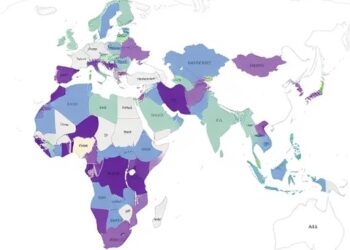Toronto – New research shows that CEOs who have moved away from their country of origin have a significantly higher tendency to make acquisitions internationally, with a preference for targets in their birth country or in countries that once colonized it.
Toronto – New research shows that CEOs who have moved away from their country of origin have a significantly higher tendency to make acquisitions internationally, with a preference for targets in their birth country or in countries that once colonized it.
“Foreign-born CEOs are taking an increasing leadership role in the corporate world,” says researcher Ron Shalev, an associate professor of accounting at the University of Toronto Scarborough who is cross-appointed to U of T’s Rotman School of Management. “In our sample, 24 per cent of the acquiring companies have foreign-born CEOs.”
In their final sample of nearly 1300 corporate acquisitions over a 14-year period, Prof. Shalev and his co-authors compared acquisitions, financial and other corporate data with biographical information on the companies’ CEOs at the time of the buys.
Foreign-born CEOs were 43 per cent more likely than domestic-born ones to acquire across borders, something explained by a preference for acquiring in the countries of their birth. When considering all potential international targets that might be on the CEO’s radar, the researchers found that foreign-born CEOs were 17 times more likely to go after a buy in their original country versus another cross-border acquisition.
That difference was explained by the CEO having a leg up by knowing more about the country and having local connections. They are also driven by a desire to “give back” to the place where they came from.
The desire to help their birth country can extend beyond targets in their birth country to those in countries that once colonized their country of origin. An Indian-born CEO working in another country might make an acquisition in the United Kingdom, for example, or a CEO born in Greece might seek a company in Turkey. In their study, the researchers found that foreign-born CEOs were more than twice as likely to make an acquisition in a former colonizing country as they were to choose any other potential international target.
“The idea is that if a CEO wants to bring pride to the birth country, she would acquire targets in the country that colonized it in the past,” says Prof. Shalev.
How are companies involved affected by CEOs tendency to acquire targets in their birth country? The acquiring company’s shareholders see a 1.3 per cent excess returns on acquisitions in the CEO birth country. Shareholders of the target company enjoy a 2.9 per cent excess premium thanks to the purchase.
Given the findings, “this is not something that should prevent the hiring of a CEO,” says Prof. Shalev. Instead, it’s simply an aspect a company’s board should be aware of and, if the CEO has a target in mind in their birth country, to take a harder look at the proposal. “In many cases these acquisitions will be good for the acquirer firm,” adds Prof. Shalev, “but not always.”
The study was co-authored with Antonio Marra of Università Bocconi in Milan and Angela Pettiniccio of Università Cattolica del Sacro Cuore and SDA Bocconi School of Management, both also in Milan.
The study appears in Journal of Accounting Research.
Bringing together high-impact faculty research and thought leadership on one searchable platform, the Rotman Insights Hub offers articles, podcasts, opinions, books and videos representing the latest in management thinking and providing insights into the key issues facing business and society. Visit www.rotman.utoronto.ca/insightshub.
The Rotman School of Management is part of the University of Toronto, a global centre of research and teaching excellence at the heart of Canada’s commercial capital. Rotman is a catalyst for transformative learning, insights and public engagement, bringing together diverse views and initiatives around a defining purpose: to create value for business and society. For more information, visit www.rotman.utoronto.ca
-30-
For more information:
Ken McGuffin
Manager, Media Relations
Rotman School of Management
University of Toronto
E-mail:mcguffin@rotman.utoronto.ca
Journal
Journal of Accounting Research
Method of Research
Data/statistical analysis
Subject of Research
People
Article Title
Home Sweet Home: CEOs Acquiring Firms in Their Birth Countries
Article Publication Date
19-Mar-2024




